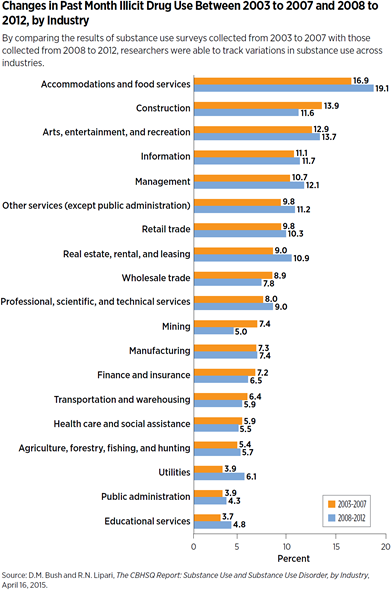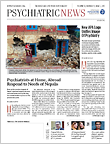Nearly 1 in 10 full-time employees in the United States has a substance use disorder, according to a report by the Substance Abuse and Mental Health Services Administration (SAMHSA). The findings, which document the industries hit hardest by alcohol and illicit drug use, highlight the importance of employee awareness and treatment programs.
For the report, researchers combined data from the National Survey on Drug Use and Health (NSDUH)—which tracks alcohol and drug use in U.S. populations—from 2008 to 2012. The responses of full-time employees aged 18 to 64 were then compared across 19 job categories. These results were then compared with the results of the NSDUH conducted between 2003 and 2007.
According to the report, 9.5 percent of full-time workers in the United States were dependent on or abused alcohol or illicit drugs in the past year. A total of 8.7 percent of full-time workers reported heavy drinking (defined as consuming five or more drinks on the same occasion on five or more days over a 30-day period), and 8.6 percent reported illicit drug use in the past month.
Drug and alcohol problems can lead to a variety of factors that prove costly for employers, including lost productivity, accidents and injuries, employee absenteeism, dips in morale, and overall health issues, Peter Delany, Ph.D., L.C.S.W.-C., the director of SAMHSA’s Center for Behavioral Health Statistics and Quality, told Psychiatric News. “It is estimated that U.S. companies lose billions of dollars a year as a result of problems related to alcohol and drug abuse,” he said. By combining five years of data from the NSDUH, researchers can “more clearly identify the variations in substance use across different industries,” Delany explained.
The highest rates of past-month heavy alcohol use were found in employees of the mining (17.5 percent) and construction (16.5 percent) industries; the lowest rates were found in health care and social assistant workers (4.4 percent). The highest rates of past-month illicit drug use were found in accommodations and food service industry workers (19.1 percent); the lowest rates were found in public administration employees (4.3 percent). Accommodations and food service industry employees also had the highest rates of past-year abuse of any substance (16.9 percent); those in the educational services sector had the lowest (5.5 percent).
“Substance abuse, both alcohol and drug use, continues to be a major problem in our workforce,” said Petros Levounis, M.D., M.A., chair of the Department of Psychiatry at Rutgers New Jersey Medical School.
By comparing the combined results of the 2008-2012 surveys with a study published in 2007, researchers found that accommodations and food service industry workers’ past month use of illicit drugs increased from 16.9 percent in 2003-2007 to 19.1 percent in 2008-2012—a factor Levounis said might be driven by “a culture of stimulant use” in the industry where employees often work late into the evening. Construction workers, in contrast, experienced dips in workers’ past-month use of illicit drugs—from 13.9 percent in 2003-2007 to 11.6 percent in 2008-2012.
“What we are seeing here reflects a public health problem that is beyond the scope of anything psychiatrists can directly address in their day-to-day practices,” Andrew Saxon, M.D., a professor of psychiatry at the University of Washington, told Psychiatric News. “What psychiatrists can do is to be alert for and comfortable with diagnosing and treating substance use problems in the patients that they do see since a large number of people with psychiatric disorders also have co-occurring substance use disorders.”
The NSDUH report highlights the opportunity for alcohol and drug awareness programs in the workplace to address the needs of employees, explained Frederick Goggans, M.D., the medical director at McLean Borden Cottage, a residential alcohol and drug treatment facility in Camden, Maine. “Over my career, which spans 35 years, I’ve noticed that those businesses that have employee assistance programs to identify workplace alcohol and drug abuse are practicing smarter business than those who don’t have programs,” Goggans told Psychiatric News.
“Communicating to people where they can go for help, providing affordable care, and reducing discrimination against those with substance use and mental disorders can do a lot to reduce the level of alcohol and drug use,” Delany said. ■
“Substance Use and Substance Use Disorder by Industry” can be accessed
here.

